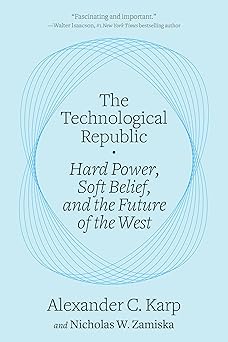
Last month, I noticed George Will's praise of this book by Alexander C. Karp and Nicholas W. Zamiska. Half-thinking that I might cause some fretting at Portsmouth (NH) Public LIbrary, I submitted it to them as a suggested purchase. They bought it, I borrowed it, and here we are.
I probably didn't need to suggest it. Amazon notes that it is (as I type) their "#1 Best Seller" in the "Government & Business" genre. And it was, at some point, a "INSTANT #1 NEW YORK TIMES BESTSELLER". In addition to GFW's two-thumbs-up, the WSJ review was also positive.
Author Karp is CEO of Palantir, a high-tech defense contractor; Co-author Zamiska is Palantir's head of corporate affairs and legal counsel. Palantir is noted for (among many other things) taking over Project Maven, the Defense Department's effort to incorporate AI into its tactics, after Google dropped out, thanks to "activist" employee protests.
So you would think Karp might be a Trump cheerleader, like his friend (and Palantir co-founder) Peter Thiel. Nope. He has described himself as a socialist and a progressive, voted for both Hillary (2016) and Kamala (2024). And (by the way) he lives in Grafton County, NH; at least that's the location of one of his "10 cross-country ski huts".
The big part of the book is its forthright advocacy of high-tech American patriotism, and its warnings that the US must not be caught with its AI pants down by (for example) China. Silicon Valley companies should not be averse to contracting with the US military. Unfortunately, high-tech employees have largely been indoctrinated in higher-ed's woke view of the world, leading to a different concentrations, typically involving consumer eyeball-catching. As they put it: "A significant subset of Silicon Valley today undoubtedly scorns the masses for their attachment to guns and religion, but that subset clings to something else—a thin and meager secular ideology that masquerades as thought." Ouch!
Other parts of the book are more business-oriented, discussing the nature of startups, founders, venture capitalists, As you might guess from the above, a number of the book's observations are idiosyncratic and unpredictable. (Some odious to me, like the suggestion that the US needs to reinstate the military draft.)
So, bottom line: interesting, and likely to both anger and elate its readers.
![[The Blogger and His Dog]](/ps/images/me_with_barney.jpg)



